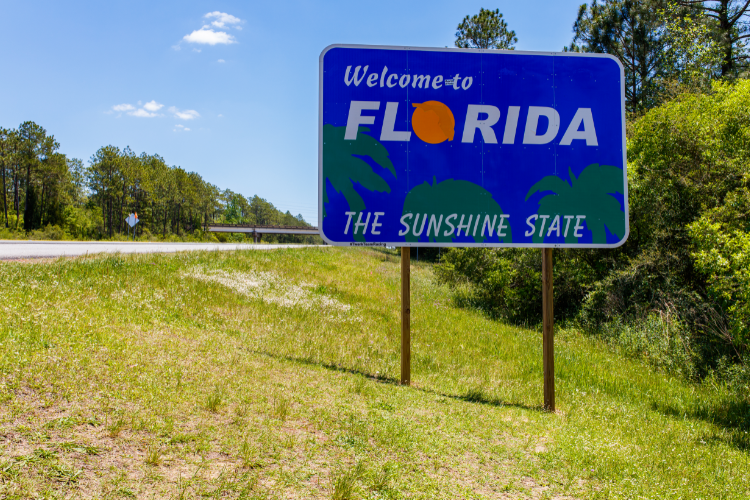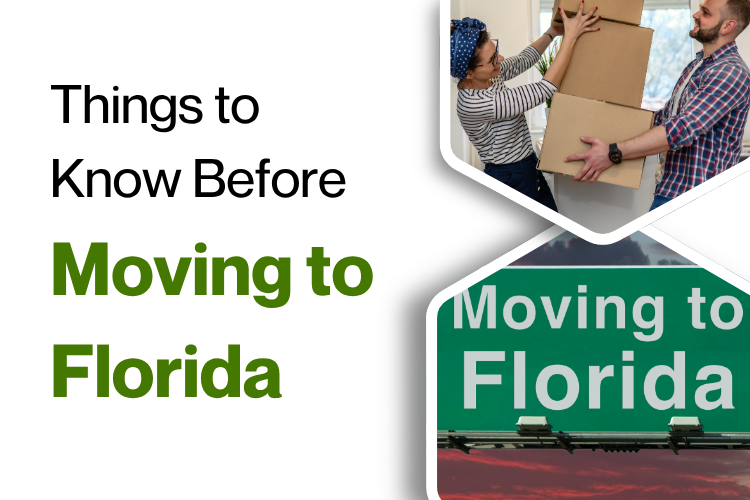If you are wondering if you should move to Florida, you’re not alone. According to recent data from the U.S. Census Bureau, Florida added more than 365,000 new residents in a single year, making it the fastest-growing state in 2022. With its sunny skies, sandy beaches, and no state income tax, it’s no surprise people are flocking to the Sunshine State. But before you pack your bags, there are a few important things to consider.
Whether you’re relocating for work, retirement, or just want to trade snow shovels for sunscreen, understanding the costs, lifestyle, and logistics will help make your transition smoother. And when you’re ready to transport your car, Sherpa Auto Transport can help get it there safely and on time. If you’re still weighing your options, see how Florida compares with other popular destinations in our top states people are moving to in 2025 as well as the best states to live in 2025.
Key Takeaways
- Florida’s warm climate, tax benefits, and lifestyle make it a top choice for relocation.
- Major cities like Miami, Tampa, and Orlando have diverse job markets and varying living costs.
- Moving logistics include choosing the right moving service and shipping your car safely.
- Sherpa Auto Transport offers reliable door-to-door car shipping to help ease your move.
In This Guide:
- Why Move to Florida?
- Cost of Living in Florida
- Working in Florida
- How to Move to Florida
- Bottom Line
- Moving to Florida FAQ
Why Move to Florida?

Florida continues to be one of the most popular relocation destinations in the U.S., and it’s not hard to see why. Looking beyond the warm climate and famous tourist attractions, the Sunshine State offers an appealing blend of economic perks, natural beauty, and cultural diversity that fits a variety of lifestyles.
Sunshine and Beaches
With over 1,300 miles of coastline and an average of 237 sunny days per year, Florida lives up to its nickname, the Sunshine State. Whether you’re drawn to the emerald waters of the Gulf Coast or the Atlantic waves along Miami’s beaches, the state offers endless opportunities for swimming, paddleboarding, or simply relaxing under a palm tree. Popular destinations like Clearwater Beach, Siesta Key, and South Beach are consistently ranked among the best beaches in the world, making everyday life feel like a vacation.
No State Income Tax
One of the biggest financial draws is that Florida doesn’t levy a state income tax, allowing residents to keep more of their earnings. This is especially attractive for retirees, entrepreneurs, and remote workers looking to maximize their savings. Combined with a relatively business-friendly environment and homestead exemptions for property owners, Florida creates an ideal setting for building long-term financial security.
Active Lifestyle
If you’re someone who loves being outdoors, Florida’s natural playground won’t disappoint. You can kayak through mangrove tunnels in the Keys, go boating in Tampa Bay, hike scenic trails in Ocala National Forest, or golf on some of the country’s top-rated courses in places like Naples and Ponte Vedra. The credit goes to its warm climate, you can enjoy these activities year-round with no need to hibernate during the winter months.
Diverse Communities
Florida is home to one of the most culturally diverse populations in the U.S. Miami, for example, is a melting pot of Latin American, Caribbean, and European influences, with a dynamic culinary and art scene to match. In contrast, towns like The Villages or Ocala offer a quieter, more traditional feel with strong community ties and slower-paced living, which is perfect for retirees or families. Whether you’re looking for city life, coastal calm, or country charm, there’s a Florida community that matches your vibe.
Cost of Living in Florida

The cost of living in Florida depends largely on where you choose to settle. While the overall state average hovers slightly below the national median, regional disparities are significant, with coastal cities and tourist hotspots carrying a premium. According to NerdWallet, residents in certain areas enjoy budget-friendly lifestyles, while others may need to brace for luxury pricing.
Miami
As one of the most iconic and cosmopolitan cities in the country, Miami’s cost of living is notably higher than the state and national averages. Real estate is competitive, with waterfront condos and high-rise apartments commanding steep prices. Everyday costs like groceries, dining out, and transportation also trend on the higher side. That said, Miami offers unparalleled access to culture, nightlife, international business, and luxury living, making it attractive to young professionals and investors despite the price tag.
Tampa
Tampa strikes a balance between urban amenities and affordability. The city has emerged as a hotspot for remote workers and tech startups, and its surrounding suburbs like Brandon, Wesley Chapel, and Riverview offer relatively affordable housing and strong school districts. Rent and home prices in Tampa remain lower than in Miami, making it a great option for families and young professionals seeking a cost-effective lifestyle with ample job opportunities.
Orlando
Known as the home of theme parks, Orlando offers a mid-range cost of living. Housing costs are reasonable, especially in suburban areas like Winter Garden or Lake Nona, and the area is experiencing rapid growth in the hospitality, healthcare, and tech sectors. While the tourism industry can bring traffic and seasonal crowds, it also contributes to a dynamic economy and diverse housing options, including apartments, townhomes, and gated communities.
Jacksonville
Jacksonville is one of Florida’s most affordable major cities, making it appealing to families, retirees, and first-time homeowners. Spreading over a large area and lower population density, Jacksonville offers larger properties at lower prices, plus a slower pace of life. The city is also investing in infrastructure and waterfront development, so its affordability doesn’t mean sacrificing opportunity or growth potential.
Important Consideration: Homeowners Insurance
One hidden cost that often surprises new residents is Florida’s homeowners insurance rates, which are among the highest in the nation. Due to the state’s exposure to hurricanes and tropical storms, insurance premiums can be significantly more expensive than in inland states—especially in coastal areas. It’s important to factor this into your housing budget, particularly if you’re moving from a region with more stable weather patterns.
Working in Florida

Florida’s job market is dynamic, diverse, and steadily growing, offering opportunities across a wide range of industries. Whether you’re job-hunting, advancing your career, or working remotely, the Sunshine State combines economic opportunity with a favorable tax structure. No state income tax means your paycheck goes further.
Tourism and Hospitality
Unsurprisingly, tourism is a cornerstone of Florida’s economy. Iconic destinations like Walt Disney World, Universal Studios, and hundreds of beachside resorts make this sector robust year-round. From hotel management to culinary arts and entertainment, there are countless roles for professionals looking to work in hospitality.
Healthcare
Thanks to a large and growing retiree population, Florida’s healthcare industry is booming. According to the Florida Hospital Association, the state is projected to need over 60,000 additional healthcare workers by 2035. From nursing to physical therapy to senior care services, this sector offers long-term career stability and demand across all regions.
Technology
Florida may not be Silicon Valley, but tech hubs in Tampa, Orlando, and Miami are gaining ground quickly. Startups and mid-sized firms focused on fintech, cybersecurity, and healthtech are popping up across the state. The Orlando Tech Council and Embarc Collective in Tampa are just a few organizations working to fuel innovation and attract talent.
Finance
Miami, in particular, has made headlines for its push to become the “Wall Street of the South.” As a growing fintech and cryptocurrency hub, Miami is attracting investors, startups, and financial service firms. With a global port and easy access to Latin American markets, it’s an ideal location for businesses seeking international reach.
Aerospace and Defense
Florida is also home to a strong aerospace and defense industry, anchored by NASA and private contractors at Cape Canaveral. Companies like Lockheed Martin, Boeing, and SpaceX operate in the state, offering high-paying roles in engineering, aviation, and project management. With commercial space exploration booming, this sector shows no signs of slowing down.
Whether you’re relocating for a new job or planning to work remotely, Florida’s favorable business climate, lower tax burden, and economic diversity make it a smart move for professionals of all backgrounds.
How to Move to Florida

Relocating to Florida can be exciting, but it does come with logistical hurdles. From hiring movers to figuring out how to get your car to the Sunshine State, planning ahead will help you save time, money, and stress.
Moving Companies
Hiring a licensed and insured moving company is a practical choice, especially if you’re relocating from another state. Reputable movers will provide a detailed quote, transparent pricing, and optional insurance coverage. Look for companies with positive online reviews and experience in long-distance or interstate moves.
Moving Trucks
If you prefer to do-it-yourself, renting a moving truck through companies like U-Haul, Penske, or Budget gives you more control over your schedule and budget. Just make sure to plan your route and account for tolls, fuel costs, and loading time, especially if you’re coming from a long distance.
Packing Services
Don’t want to do the heavy lifting yourself? Many moving companies now offer full-service packing and unpacking, including materials, labor, and safe handling of delicate items. This service is especially helpful for busy families, elderly movers, or anyone relocating from across the country.
Don’t Forget Your Car
If you’re bringing a vehicle, driving cross-country can be time-consuming and physically draining. A safer and more efficient alternative is using a reliable auto transport company. Sherpa Auto Transport offers door-to-door service that simplifies car relocation, whether you’re moving a sedan, SUV, or classic car. Plus, if you’re moving a long distance, their breakdown of car shipping costs and how long it takes to ship a car cross-country can help you plan your timeline and budget with confidence.
Bottom Line
Moving to Florida offers exciting opportunities, from lower taxes to sunny adventures. But before taking the leap, weigh the cost of living, job options, and lifestyle fit. Whether you’re relocating from New York or California, understanding how to move to Florida ensures a smoother transition. Sherpa Auto Transport makes it easier by offering door-to-door service and expert guidance on how to ship a car cross-country. You handle the boxes, we’ll handle the keys.
Moving to Florida FAQ
What is required to move to Florida?
A valid driver’s license, proof of residency, and vehicle registration are typically needed. You must update your license within 30 days.
Is it worth moving to Florida for tax purposes?
Yes, especially for high earners and retirees, thanks to the absence of state income tax.
Can I ship my vehicle to Florida?
Absolutely. Sherpa Auto Transport provides safe and reliable vehicle shipping services nationwide.
How long does it take to ship a car cross country?
The time it takes to ship a car cross country typically takes 7-10 days depending on origin, distance, and time of year.







